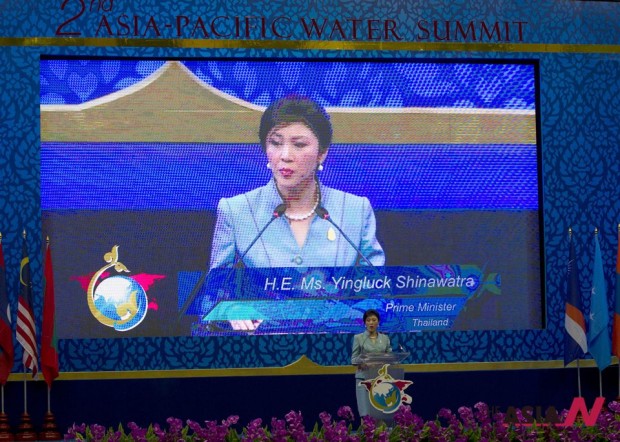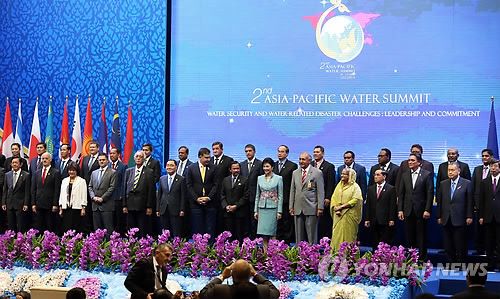Asia-Pacific leaders warn of water conflict threat

Thailand's Prime Minister Yingluck Shinawatra delivers a speech at the opening of the 2nd Asia-Pacific Water Summit in Chiang Mai, north of Bangkok, Thailand Monday, May 20, 2013. Thailand hosted the 2nd Asia-Pacific Water Summit, bringing together leaders and dignitaries from 50 countries to discuss water resource management and water-related disaster prevention and management. <AP Photo/Sakchai Lalit>
Fierce competition for water could trigger conflict unless nations cooperate to share the diminishing resource, leaders from Asia-Pacific nations warned on May 20 at a regional water security forum.
From Central to Southeast Asia, regional efforts to secure water have sparked tensions between neighbors reliant on rivers to sustain booming populations.
Breakneck urbanization, climate change and surging demand from agriculture have heaped pressure on scarce water supplies, while the majority of people in Asia-Pacific still lack access to safe water despite strong economic growth.
“There could be a fight over resources and no country in the region can handle these challenges alone,” Thailand’s Prime Minister Yingluck Shinawatra cautioned in an address to the 2nd Asia-Pacific Water Summit held under the theme of ‘water security and water-related disaster challenges: leadership and commitment’ in the northern Thai city of Chiang Mai.
She hailed the forum as one of the routes to satisfying countries’ thirst peacefully. A Thai firm is behind a controversial dam over the Mekong River in Laos, a project decried by downstream countries Vietnam and Cambodia which fears it could ruin their farming and fishing industries.
Delegates from 40 countries adopted a sweeping ‘Chiang Mai declaration’ pledging to build regional resilience to natural disasters, share technical skill on management of the resource and push water security to the top of the agenda.
The official declaration highlighted the need to encourage the inclusion of disaster risk reduction in the United Nations’ development agenda beyond 2015, upgrade regional cooperation, promote the efficient use of water resources, and forge better partnerships between the government and all other stakeholders in water-resource management and development.
The unofficial one, issued by the People’s Network of North and Northeastern River Basins, also called for an integrated approach to water management that involved cooperation from all stakeholders.
Both versions came at a time when people in the region have become acutely aware of water-related threats, including disasters, and the need for cooperation, in the wake of a massive flood in 2011.
Rapid urbanisation, climate change and surging demand from agriculture have heaped pressure on scarce water supplies, while most people in the Asia-Pacific still lack access to safe water despite booming economic growth.
Asian nations need to plow an estimated $380 billion into water and sanitation systems in the decade to 2020 if they are to achieve water security, Brunei Sultan Hassanal Bolkiah warned the forum.
The “vital undertaking” comes against a backdrop of competition that “could lead to international disputes,” he cautioned.
One such row is between Uzbekistan and its neighbors Tajikistan and Kyrgyzstan, which want to build two of the world’s biggest hydro-electric power stations. Tajik President Emomali Rakhmon defended his country’s right to exploit its natural resources but pledged to pursue a “peaceful solution” to the dispute, which has seen angry rhetoric soar over recent months.
Bangladeshi Prime Minister Sheikh Hasina cited a water-sharing treaty between her nation and India over the Ganges river as an example of successful water diplomacy.
“Only judicious management of access to water resources” will prevent conflict, she said, adding that low-lying Bangladesh has around 30 million people exposed to rising sea levels.
The Asian Development Bank last month warned that nearly two-thirds of people in Asia-Pacific have no clean, piped water at home despite the region’s strong growth, blaming poor management and a lack of investment in infrastructure.
Climate change and environmental damage are also posing unpredictable threats to the region’s water supply, with glaciers that feed rivers in retreat and once-pristine waterways polluted with waste.
The region must co-operate to tackle the “new reality,” Georgian President Mikheil Saakashvili said. “Things are happening that have never happened before” because of climate change, he warned. “There’s no place for conflict there.” <Compiled from several media reports>



























































